A Heart for Service Leads Nurse Elizabeth Terekh to Homeland HomeHealth
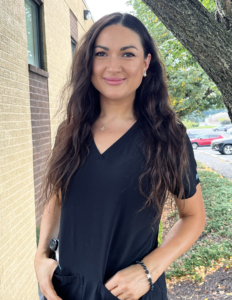 The life we lead can be reinvented by taking chances and following our heart. Nearly 15 years ago, Elizabeth Terekh took a chance and moved to the United States to explore our great country and pursue her love of medicine. Today, Elizabeth is a registered nurse with Homeland HomeHealth and treats every day as an adventure and gift.
The life we lead can be reinvented by taking chances and following our heart. Nearly 15 years ago, Elizabeth Terekh took a chance and moved to the United States to explore our great country and pursue her love of medicine. Today, Elizabeth is a registered nurse with Homeland HomeHealth and treats every day as an adventure and gift.
Elizabeth grew up in Kharkiv, Ukraine two hours from the Russian border. After high school she attended college, earning a degree in business administration. She soon realized a life in the business world did not feed her soul or bring her happiness. When a family friend invited her to Camp Hill, Pennsylvania, she jumped at the opportunity. She bravely boarded the plane with hope and determination to start a new life focused on serving others in need.
“I always loved medicine,” Elizabeth says. “I wanted my days to be filled with helping others.”
Elizabeth was fluent in English and quickly excelled in her courses at Harrisburg Area Community College where she became a registered nurse. She went on to work in a hospital setting for several years before joining the team at Homeland HomeHealth four years ago.
“Every day is filled with purpose,” Elizabeth adds. “I know someone needs my care and compassion.”
As a registered nurse, Elizabeth treats patients in the comfort of their homes after they have been discharged from the hospital or short-term rehab. Homeland’s HomeHealth program provides physician-ordered treatment to meet each patient’s unique needs in areas such as wound care, cardiac care, intravenous therapy, fall prevention and rehabilitation services.
Elizabeth works directly with each patient’s medical provider to determine the appropriate plan of care. This includes an initial assessment of the patient’s health. Elizabeth and the Homeland team then determine the frequency of visits to help the patient meet his/her goals of comfort and independence. In addition to nurses like Elizabeth, the Homeland HomeHealth team can include physical, occupational and speech therapists; a nutritional counselor and social workers.
For Elizabeth, spending time with patients and their families makes this a labor of love. She looks forward to learning about her patient’s lives and seeing them progress in their healing.
“Every patient is someone special,” Elizabeth says. “I treat everyone like family.”
Elizabeth is one to quickly admit she loves adventure and mental challenges. She recently earned her bachelor’s degree in nursing and hopes to pursue additional certifications in areas such as wound care in the near future. She strives to live her best professional life in service of Homeland and her patients.
“I love this work,” Elizabeth adds. “Serving others lifts my heart.”
For more information on home health services, contact Homeland HomeHealth or call (717) 412-0166.

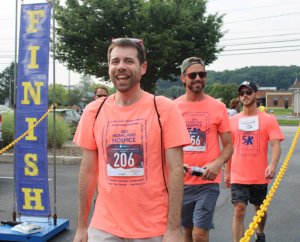
 Bygone days of elegance and refinement made a return at Homeland Center, as residents filled the main dining room for a spring tea.
Bygone days of elegance and refinement made a return at Homeland Center, as residents filled the main dining room for a spring tea.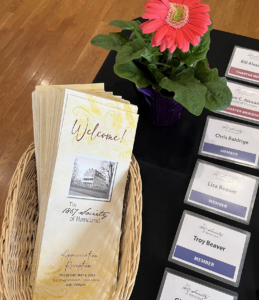 Beneath the glowing chandeliers and soaring ceilings of the Mediterranean-style King Mansion, more than 65 members of the
Beneath the glowing chandeliers and soaring ceilings of the Mediterranean-style King Mansion, more than 65 members of the 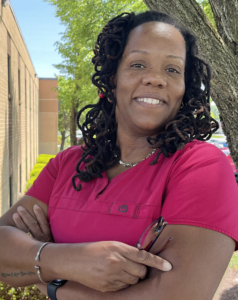 Since she was a child, Chastity (Chaz) Anderson Spencer has found joy in helping others. Her kind heart and keen ability to put her compassion into action led Chaz to become a Certified Nursing Assistant (CNA) nearly 20 years ago. For the past 11 years, Chaz worked as a CNA for Homeland Hospice, a nonprofit hospice program that serves communities throughout central Pennsylvania.
Since she was a child, Chastity (Chaz) Anderson Spencer has found joy in helping others. Her kind heart and keen ability to put her compassion into action led Chaz to become a Certified Nursing Assistant (CNA) nearly 20 years ago. For the past 11 years, Chaz worked as a CNA for Homeland Hospice, a nonprofit hospice program that serves communities throughout central Pennsylvania.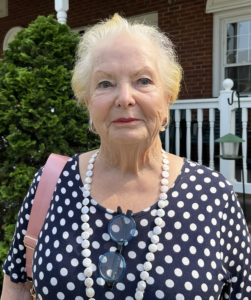 Since joining Homeland’s Board of Managers in October 2024, Sandee O’Hara has been deeply impressed by the power that 18 committed women can generate.
Since joining Homeland’s Board of Managers in October 2024, Sandee O’Hara has been deeply impressed by the power that 18 committed women can generate.
